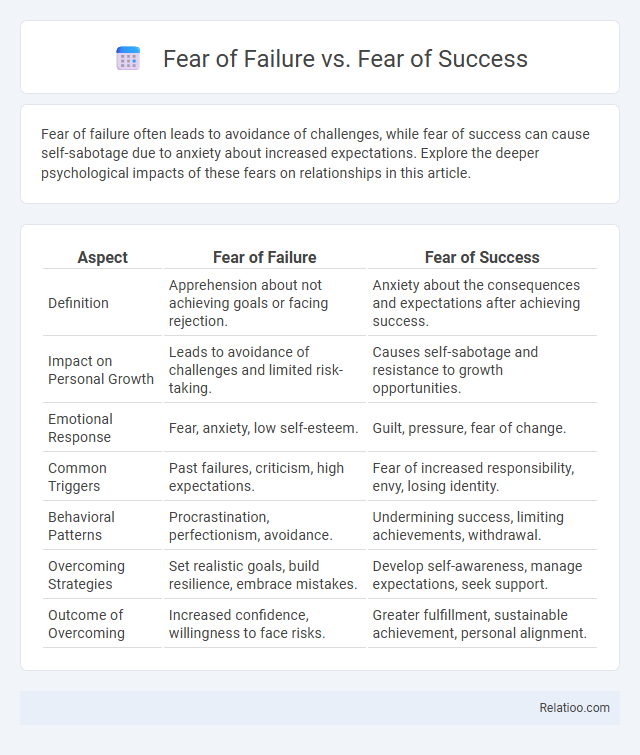Fear of failure often leads to avoidance of challenges, while fear of success can cause self-sabotage due to anxiety about increased expectations. Explore the deeper psychological impacts of these fears on relationships in this article.
Table of Comparison
| Aspect | Fear of Failure | Fear of Success |
|---|---|---|
| Definition | Apprehension about not achieving goals or facing rejection. | Anxiety about the consequences and expectations after achieving success. |
| Impact on Personal Growth | Leads to avoidance of challenges and limited risk-taking. | Causes self-sabotage and resistance to growth opportunities. |
| Emotional Response | Fear, anxiety, low self-esteem. | Guilt, pressure, fear of change. |
| Common Triggers | Past failures, criticism, high expectations. | Fear of increased responsibility, envy, losing identity. |
| Behavioral Patterns | Procrastination, perfectionism, avoidance. | Undermining success, limiting achievements, withdrawal. |
| Overcoming Strategies | Set realistic goals, build resilience, embrace mistakes. | Develop self-awareness, manage expectations, seek support. |
| Outcome of Overcoming | Increased confidence, willingness to face risks. | Greater fulfillment, sustainable achievement, personal alignment. |
Understanding Fear of Failure
Fear of failure stems from the anticipation of negative outcomes, often rooted in past experiences and self-doubt, impacting motivation and decision-making. It contrasts with fear of success, which involves anxiety about the consequences of achieving goals, such as increased expectations or loss of identity. Recognizing how fear of failure drives self-sabotage behaviors enables targeted strategies to build resilience and foster personal growth.
Decoding Fear of Success
Decoding fear of success involves recognizing subconscious doubts about achieving goals and the potential consequences of surpassing expectations. This fear often manifests as self-sabotage, where your actions unconsciously prevent progress despite desire and capability. Understanding how fear of success differs from fear of failure is crucial for breaking patterns that hinder your growth and unlocking your full potential.
Root Causes of Each Fear
Fear of failure often stems from insecurity, past negative experiences, or high self-expectations that associate mistakes with personal worth. Fear of success originates from anxiety about increased responsibilities, social isolation, or disrupting existing relationships due to newfound achievement. Sabotage behavior roots in subconscious resistance, low self-esteem, or fear of change, leading individuals to undermine their own progress to avoid perceived threats or discomfort.
Psychological Impact: Failure vs Success
Fear of failure triggers anxiety and self-doubt, often leading to procrastination and missed opportunities as the brain anticipates negative outcomes. Fear of success can cause internal conflict and self-sabotage, driven by concerns over increased expectations and social pressure following achievements. Psychological sabotage manifests as unconscious behaviors that undermine progress, reflecting deep-rooted fears around both failure and success, affecting self-esteem and emotional well-being.
How Both Fears Manifest in Life
Fear of failure and fear of success often manifest as procrastination, self-doubt, or avoidance of new opportunities, creating invisible barriers in personal and professional growth. Sabotage frequently emerges as self-destructive behavior, like missing deadlines or undermining achievements, rooted in these fears. Understanding Your patterns can help break the cycle and foster proactive, confident decision-making.
Overlapping Symptoms and Differences
Fear of failure, fear of success, and self-sabotage share overlapping symptoms such as procrastination, anxiety, and self-doubt, which can hinder personal and professional growth. Your awareness of these fears helps differentiate that fear of failure stems from avoiding negative outcomes, fear of success involves anxiety over new responsibilities or expectations, and sabotage reflects unconscious actions that prevent achievement. Recognizing these distinctions allows targeted strategies to overcome barriers and unlock your full potential.
Personal Growth: Stuck by Fear
Fear of failure, fear of success, and self-sabotage are deeply intertwined obstacles that hinder personal growth by creating a cycle of stagnation and self-doubt. Your mindset can trap you in hesitation, where the fear of failing prevents taking risks, while the fear of succeeding raises anxiety about increased expectations and change. Overcoming these fears requires recognizing their psychological roots and consciously choosing actions that promote resilience and forward momentum.
Strategies to Overcome Fear of Failure
Fear of failure often paralyzes your progress by creating self-doubt and avoidance behaviors, whereas fear of success can stem from anxiety about increased expectations, and sabotage commonly manifests as self-defeating actions that undermine achievements. Strategies to overcome the fear of failure include cognitive restructuring to challenge negative beliefs, setting realistic goals that promote incremental progress, and practicing resilience-building techniques such as mindfulness and exposure to manageable risks. Developing a growth mindset empowers you to embrace challenges as opportunities for learning rather than threats to your self-worth.
Strategies to Overcome Fear of Success
Fear of success often triggers self-sabotage and persistent anxiety, limiting personal and professional growth. Strategies to overcome fear of success include adopting a growth mindset, setting realistic goals, and building resilience through positive reinforcement and visualization techniques. Developing support networks and practicing self-compassion also help dismantle fears by validating achievements and reducing the pressure associated with success.
Embracing Growth Beyond Fear
Fear of failure, fear of success, and self-sabotage often stem from deeply rooted anxieties that limit your potential to grow and achieve. Recognizing these fears as psychological barriers empowers you to shift mindset, fostering resilience and embracing challenges as opportunities for development. By consciously addressing and reframing these fears, you unlock new pathways toward personal and professional growth beyond limitations.

Infographic: Fear of Failure vs Fear of Success
 relatioo.com
relatioo.com